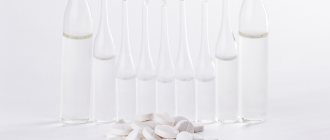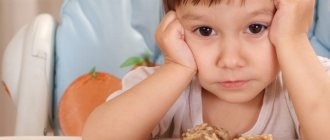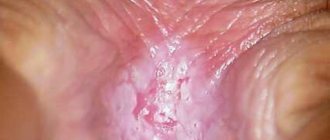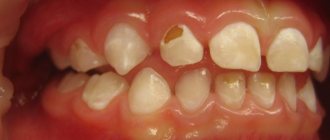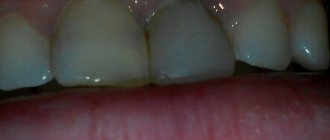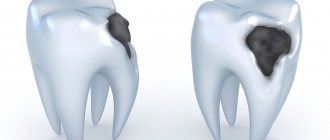- Why is there so much saliva?
- Saliva and its functions
- How to help your baby
- Baby care
- If the abundance of saliva scares you
Just yesterday your little one was a cute baby, but today he suddenly started blowing bubbles.
What happened, why is your mouth watering so much that you don’t have time to wipe it off? What should I do: call a doctor or is it not dangerous and will they go away on their own? With the birth of a child, a mother has new questions every day. Before, there were no tears when I cried. Then you need to wipe your mouth, clean your ears, but it’s scary to get hurt. Now suddenly my mouth started watering, and for some reason so much. There are many questions, let's consult a pediatrician.
Why is there so much saliva?
Your newborn is growing, becoming large, and reaching two to three months of age. At this stage of development, the salivary glands form and begin to work. Therefore, excessive drooling is normal.
During this same period, the baby becomes more active. The child explores and tastes everything that surrounds him. Therefore, the body produces a protective antibacterial environment - saliva, which washes away dirt that gets into the small mouth.
The newborn has already drooled, but the baby still does not know how to swallow it, so streams flow down his chin. Parents are frightened by such profuse drooling. If the saliva is clear, not foamy, not thick, not stringy, experienced mothers do not worry. Mothers know that this is a normal state for a baby at this age.
How to proceed?
Imagine having a constantly wet chin... That's it! And the little man has to put up with this. So the task of a loving mother is to ease and support her little one. What do we have to do?
- Don't forget about bibs. In addition to the fact that they are convenient, they are also a great way to teach your baby to be neat. After all, after the end of the “drooling” period in life, the stage of “adulthood” will begin, and your child will learn to eat independently. Agree, even in theory this sounds promising. But a bib will come to the rescue and save you from many stains. By the way, in addition to the usual ones, you can buy special products for teething children. They are made of a fabric base and oilcloth.
- Due to constant contact of the skin with an irritant - saliva - has your chin become very red and irritated? In this case, you need to soothe the skin by treating it with nourishing and then moisturizing creams. Ointments with the addition of zinc also work very well - for drying out areas of inflammation.
- Give a pacifier more often. While many pediatricians defend the point of view that pacifiers are harmful, this simple device really helps to “pacify” the flow of saliva, since with its assistance the baby learns to swallow liquid.
- Be patient. Until the salivary glands “learn” to secrete secretions in doses, the time will come to rejoice at the teeth that have come out. So the drool will flow profusely again. But this will pass... by 2-3 years.
Saliva and its functions
Saliva is necessary for the body at any age. In the oral cavity, under the tongue, on the inside of the cheeks, behind the lower teeth, there are salivary glands. They work constantly, producing up to two liters of fluid per day for an adult.
Saliva takes care of maintaining pH in the desired state, preventing the formation of tartar and caries. Saliva destroys harmful microorganisms, thereby preventing unpleasant odor in the mouth.
Saliva is involved in processing and digesting food. Salivary enzymes help break down and digest substances and produce glucose from starch.
This liquid softens and liquefies food for better digestion. Without saliva, taste buds do not work.
In newborn babies, saliva performs many tasks related to digestion and protection. Protective functions of saliva in a baby’s life:
- Protection of the oral cavity from the colonization and proliferation of pathogenic microbes and bacteria.
- Protection and lubrication of mucous membranes from irritation and damage.
- Protecting mucous membranes from dehydration and drying out during swallowing, chewing, and talking.
- Cleaning the oral cavity from foreign bacteria and food debris.
In addition to protective functions, saliva performs a number of other tasks. It plays a great role in matters of nutrition and the functioning of the gastrointestinal tract. The enzymes it contains are responsible for the initial processing of starch. And tongue lipase helps infants digest milk. It is saliva that forms the sense of taste by helping taste buds dissolve solids in food.
In the future, the gums will swell, become inflamed, the teeth will feel, saliva will soften the pain and protect the wounds from infection. And when the teeth erupt, saliva will maintain the integrity of the tooth enamel by treating it with calcium, phosphate, and fluoride dissolved in it.
How to help your baby
Parents will have to come to terms with and go through the period of slobbering toddler. It is unpleasant for the baby to be slobbery, so parents take special care and care for the baby at this time.
It’s not in vain, apparently, that our great-grandmothers invented bibs for babies. Bibs will help now: the fabric absorbs liquid, blouses remain dry, the skin on the neck and chest is also dry.
Sometimes a baby drools so much when lying down that he chokes and simply choke on it. He may experience a cough, even wheezing. To prevent your child from getting into trouble, place him on his side or tummy, or you can put him on a low pillow. So, the drool will flow down and will not harm the baby.
If a baby sucks on a pacifier, he is able to swallow his saliva. When going for a walk, give your baby a pacifier. Using a pacifier is another way to cope with the problem.
Soon the time for teething comes, the baby's gums itch and itch, he constantly chews something to relieve the itching. Help him, massage his gums with your finger. And in the places where the first teeth appear, press lightly. On the doctor's recommendation, buy a special product and lightly lubricate the gums with it, this will calm the baby.
Actions to take when spitting up
Sometimes spitting up is easier to prevent than to treat. This does not always apply to cases where regurgitation is not physiological in nature and requires specialist supervision and possible surgical intervention.
So, simple tips to help minimize regurgitation:
- The first time the baby is put to the breast. Try to master this skill while still in the maternity hospital, turning to medical staff for help. You can also seek advice from a breastfeeding specialist. A baby who is properly attached to the breast will swallow less air during feeding, which will reduce the risk of regurgitation and stomach problems in the form of excessive gas formation.
- Get your baby used to lying on his tummy on a hard surface before feeding. This is a kind of massage that also has a beneficial effect on the baby’s stomach, reducing regurgitation and preventing colic and bloating.
- Before feeding, you can do a light massage of the abdomen in a clockwise direction, and light exercises.
- Try not to make your baby scream from hunger, as he will definitely swallow excess air, which will become a likely cause of regurgitation and just a bad mood. If this happens, try to calm the baby down first, and then start feeding.
- If feeding formula from a bottle, make sure it is full. The nipple of the bottle should be filled with milk, not air. Particular attention should be paid to the nipple, namely the hole in the nipple. It must be selected according to the age of the child. The inscription on the box of the bottle will help with this, indicating what age the nipple is designed for. The hole in the nipple regulates the flow of fluid and avoids choking during feeding.
- If during the feeding process the baby stops or begins to arch and cry, you can stop feeding and help the baby burp out excess air. To do this, take him in your arms, position him facing you so that the baby's arms and his head are on your shoulder. The baby will burp and perhaps return to eating again.
- Don't overfeed your baby. It is worth increasing the number of feedings, but reducing the portion. When bottle-feeding, the doctor will calculate the rate of food intake at a time and the total amount per day, based on the age and weight of the baby.
Many pediatricians, gastroenterologists, and surgeons take into account the recommendations of the working group of the European Society of Gastroenterology and Nutrition:
- position treatment
- use of therapeutic nutrition
- medication use
- surgery
- Treatment by position. During feeding, it is important to ensure that the baby is in a position in which the head and upper body are raised above the rest of the body. For this purpose, you can use a pillow or diaper. After feeding, hold the baby in a column to allow excess air to escape. Do not swaddle your baby tightly so as not to squeeze the stomach. After feeding, it is recommended to place the baby on his stomach or right side. But WHO recommends putting your baby to sleep only on his back.
- Medical nutrition. This means more frequent feedings with smaller portions. For children who are bottle-fed, the doctor may recommend the use of a therapeutic antirefluxor formula (AR is its designation on the package). These mixtures have an increased proportion of casein relative to whey proteins, so they are thicker, which prevents their release through the esophagus. Also, these types of foods are often enriched with thickeners, for example, starch or gum - a substance that, under the influence of the acid of the stomach contents, becomes thicker. This substance has the peculiarity of not being dissolved by enzymes, which allows it to remain thick in the stomach longer. It also promotes the active movement of food into the intestines from the stomach.
For more information about artificial feeding, read our article “Artificial feeding: feeding rules and types of formulas.”If the child is breastfed, then, on the recommendation of a doctor, the mixture can be added to the diet and enter the child’s body before milk. The duration of use of this mixture is about 3 months.
- Drug treatment. It is prescribed by a doctor, if the previously indicated methods have not brought results, then it is possible to treat with medications that can significantly improve the contraction of the intestinal walls.
- Surgical intervention. This is an extreme measure when the main cause of regurgitation is pathology.
Now more specifically about each:
Baby care
Excessive salivation requires increased care from parents. Mothers stock up on handkerchiefs or soft napkins to wipe the newborn's mouth and chin.
Even with constant wetting of the chin, dripping drool causes redness, peeling, and a rash on the skin around the mouth and on the chin. Knowledgeable mothers advise using baby cream and lubricating irritated areas several times a day until the skin is restored.
Your doctor will tell you which creams and ointments to relieve irritation on your child’s skin. You need to lubricate delicate skin with the prescribed products very carefully, in a thin layer, so as not to cause even more irritation.
If the abundance of saliva scares you
Usually, a 2-3 month old baby begins to produce copious amounts of saliva as the salivary glands begin to function. The second stage, which decorates the little one with bubbles, is the period of teething.
During colds and other diseases of the ENT organs, with allergic reactions to house dust or animals, when the nose does not breathe, the baby has to open his mouth. In such cases, the amount of saliva that can drain from the mouth increases. Consult a doctor, eliminate the cause, and the amount of saliva will return to normal.
The causes of excessive leakage may be gastrointestinal diseases. And also if the baby does not know how to close his mouth tightly. It must be said that when affected by an oral disease such as thrush, saliva partially loses its functions. In particular, the digestion of starch into glucose stops. The absence or insufficiency of sugars in the body of infants will negatively affect their development. Therefore, during your daily morning toilet, look into your baby’s mouth, and if you have any suspicions, contact your pediatrician.
But if there is too much saliva, it is of a different color, type or consistency, if the abundance of discharge scares you, be sure to consult a pediatrician. If necessary, after a thorough examination and tests, the pediatrician will refer you to another specialist. An ENT specialist, a neurologist, a dentist, and a surgeon can help.
Using saliva analysis, the doctor will make the correct diagnosis. If the baby has problems of an endocrine nature or in the adrenal cortex, a saliva test will show the disease. To obtain accurate data, saliva is tested several times during the day. It is not difficult, painless, and will show the right result.
If the baby is healthy, the period of drooling will soon stop, the baby's mouth and chin will be dry.
When a baby begins to put not only his fists into his mouth, but also all objects that he is able to reach, the first thought of the parents is that teeth are coming out. The eruption of baby teeth in young children is often accompanied by increased salivation. This is not the only reason for the occurrence of such symptoms, however, due to the prevailing stereotype, most mothers of children in their first year of life do not try to understand why the baby’s gums are itchy and eliminate the source of severe discomfort.
What is regurgitation?
Regurgitation in infants is considered to be the spontaneous release of a small amount of just eaten food (milk or formula) into the baby’s mouth from the stomach.
Content:
1. Types of regurgitation |
00:56 (in video) 2. Physiological causes of regurgitation | 01:40 (in video) 3. Functional causes of regurgitation | 02:43 (in video) 4. Permissible frequency of regurgitation 05:13 (in video) 5. Until what age can regurgitation continue | 05:47 (in video) 6. Is it necessary to feed the baby after spitting up | 06:23 (in video) 7. Actions when spitting up | 07:11 (in video) 8. Congenital pathologies of the gastrointestinal tract, as a cause of regurgitation 9. Actions to prevent regurgitation Online consultation with a pediatrician (Breastfeeding Specialist)
Online consultation
During the consultation, you will be able to voice your problem, the doctor will clarify the situation, interpret the tests, answer your questions and give the necessary recommendations.
Drooling and chewing of fists during teething
It is teething that most often provokes the appearance of itching and painful sensations in the oral cavity in infants. At the same time, the child is drooling in bubbles, he constantly holds his fists in his mouth. As a rule, this process begins at the beginning of the 6th month of life, but often the first symptoms appear at 2-3 months of age, and sometimes earlier. The advancement of the first molars in the gums may be accompanied by an increase in body temperature, disturbances in the gastrointestinal tract, and increased excitability. However, the main sign of the appearance of teeth is swelling and swelling of the baby’s soft gum tissue.
Teething period
Teething usually begins around 6 months of age. The child becomes whiny and irritable. The process of tooth extraction is accompanied by pain and the formation of wounds on the gums. They can greatly disturb the baby, bringing him a lot of suffering.
Salivation helps make pain less intense: saliva has an anti-inflammatory and calming effect. Teething is greatly extended over time and sometimes lasts up to 2 (and even 3) years.
Important! Increased salivation up to 2 years of age is most often caused by natural causes and is physiological.
Cause: oral diseases (stomatitis, thrush)
If the baby constantly sucks his fists, and increased salivation is accompanied by an increase in body temperature, a white coating is clearly visible on the tongue, gums and mucous membranes, you should immediately consult a doctor. These symptoms indicate damage to the oral cavity by a fungus of the genus Candida. Factors contributing to the appearance of thrush in children:
- Sugar consumption. The baby can receive it both from baby food (manufacturers often use artificial sweeteners to improve taste) and from breast milk (if the mother’s diet contains refined foods, sweets and preservatives in large quantities).
- Decreased immunity. Thrush in infants often accompanies infectious diseases.
- Poor hygiene. Pathogenic fungi enter the body of a two to three month old baby with dirty nipples and toys, as well as if he puts dirty fingers or fists in his mouth.
- Taking antibiotics. They destroy bacteria that prevent the growth and reproduction of pathogens.
Often children at 2-4 months drool continuously due to stomatitis. With this pathology, blisters and ulcers appear on the oral mucosa. Babies may refuse to eat due to severe pain.
Newborn period
In newborn babies, salivation is normally absent due to the underdevelopment of the salivary gland apparatus. However, often a mother may notice how, in the first hours of a child’s life, a colorless liquid, very similar to saliva, is actively secreted from his mouth.
Most often, this is how amniotic fluid comes out, which the baby managed to swallow while passing through the birth canal. Normally, this phenomenon should stop a few hours after birth. If drooling continues longer, it is better to inform your pediatrician (neonatologist) about this in order to exclude serious health problems.
Neurological disorders
In rare cases, excessive salivation indicates neurological disorders (cerebral palsy, various abnormalities in the functioning of the central nervous system). In this case, the following are observed:
Such conditions are diagnosed by specialists in the first months of a baby’s life and require serious and long-term therapy. Excessive drooling is a secondary symptom.
Parents should regularly wipe their baby's chin, neck and chest to avoid skin irritation. If your child constantly sucks his fist or keeps his fingers in his mouth, you need to keep his hands clean. If possible, you should disinfect all objects that he may lick. The lack of necessary hygiene measures leads to the entry of pathogenic microorganisms into the body, weakened by the underlying disease. The development of an infectious process can significantly worsen the baby’s condition.
Is fist sucking harmful?
Often parents try to wean their child off this habit because they are concerned about his bite and the quality of his future teeth. Some displacement of the teeth is indeed possible if the child chews his fist, fingers and other objects very enthusiastically. But this only affects baby teeth and does not affect the molars.
Applying mustard, pepper and other tasteless substances to your fingers or fist is not the best idea, as it will cause stress and will not help wean your child off the habit. It is better to just leave the child alone and let him do what his body requires.
22.11.2017
- Share:
Beginning ARVI
Sometimes excessive salivation, accompanied by regular attempts by the baby to put his fingers and fists in his mouth, indicates the onset of an infectious disease such as ARVI, flu, sore throat, etc. In this case, the child has a fever, nasal congestion or mucus discharge from the sinuses. Many babies begin to sneeze and cough.
The main function of saliva is protection against pathogenic microbes and bacteria. This is what causes the increased activity of the salivary glands in babies 2-4 months of age against the background of the onset of ARVI and other inflammatory processes localized in the oral cavity.
In this case, the main help lies in the fight against the causative agent of the disease. The cleanliness of the baby’s hands, pacifiers and toys should be taken with special care during this period, as there is a high risk of harmful microorganisms being introduced into the baby’s body.
Types of regurgitation in newborns
There are 3 types of regurgitation:
- belching - the release of air captured by the baby when eating, as a rule, a small volume of milk or formula comes out;
- regurgitation - the food received and the air along with it come out very abundantly. In time, this occurs simultaneously with the end of the meal or after a short period of time. Children in the first 5 months of life are more often susceptible to this phenomenon. Does not cause anxiety or crying in the child, appetite does not disappear;
- vomiting is similar to regurgitation, but there are a number of features. The child is capricious, cries, becomes sleepy, lethargic. There is a complete loss of appetite and reluctance to eat.
How to relieve the condition of a baby who is drooling?
If a newborn constantly drools a lot, it is not only unhygienic, but also dangerous due to the appearance of irritation on the baby’s delicate skin. The most effective way to combat excess moisture in the mouth, neck and chest is to constantly dry your baby with a dry towel or napkin. In addition, you can use bibs. They will help protect your clothes from getting wet. What should you do if, despite all your efforts, heat rash still appears? You can relieve discomfort with Bepanten cream. It should be applied to clean, dry skin several times a day.
When a baby drools while lying on his back, he may choke or choke on it. You can avoid such consequences by turning the baby on its side and placing a cushion under the backrest. This way he won't be able to roll over in his sleep. A pacifier will also help to swallow drool, as the baby swallows the liquid accumulated in the mouth while sucking it.
During the first year of life, a child sucks his fists for many reasons. These are psychological aspects (this is how he calms himself down), and itching of the gums during teething, and irritation caused by various infectious diseases of the oral cavity. In order to help your baby get rid of unpleasant and painful sensations, pediatricians recommend massaging his gums. This can be done using special attachments or your fingers. Hands must first be washed and disinfected.
In addition, you can choose a dental gel with a cooling effect. Such products are sold without a prescription in pharmacies. They are applied to the gums and lightly rubbed into the mucous membrane. They not only relieve itching and have an analgesic effect, but also disinfect the oral cavity.
After a newborn is born, he develops and matures every day. And parents watch with affection the changes in the child. However, there are a number of phenomena that may alarm happy mothers. These include increased salivation. Perhaps no one would pay attention to the fact that a two- or three-month-old child’s drool is flowing almost in streams. But no mother can calmly look at the consequences of increased salivation in a child. Irritation of the chin and diaper rash in the folds of the neck make parents seriously think about the reasons for the increase in the amount of saliva in the baby. This phenomenon is most often observed when the child is 3 months old. Drooling occurs during this period for a number of reasons, the main one being banal teething. However, there are more alarming factors that can cause a child to drool in bubbles.
Congenital pathologies of the gastrointestinal tract as a cause of regurgitation
- Hiatal hernia. This is a congenital defect expressed in the underdevelopment of the structures of the diaphragm. Regurgitation begins within a couple of weeks after birth, lasts a long time, occurs immediately after feeding, the baby stops gaining weight or even loses weight. To identify this diagnosis, an x-ray examination is performed.
- Relaxation of the cardia (or chalasia of the sphincter that separates the esophagus and stomach). If it is not completely closed, then milk is released unchanged from the stomach into the esophagus. This type of regurgitation appears in the first days after birth and can be severe, especially if the baby has not burped up air. The child is lethargic, sucks poorly, sleep is disturbed, and there is no weight gain. X-ray examination can confirm the diagnosis.
- short esophagus (congenital anomaly) - the stomach is located above the diaphragm due to the fact that the esophagus does not correspond to the size of the chest.
If a mother is alarmed by the baby’s regurgitation and at least one of these signs is present, this is a reason to consult a doctor immediately.
- the child spits up often and a lot;
- bile and blood are present;
- regurgitation began after six months or did not go away by this time;
- poor weight gain, lethargy, rare urination.
- restless behavior
- increase in body temperature,
- skin rashes.
The formation of a mechanism that prevents regurgitation begins in the last 3 months of the mother’s pregnancy and continues after the birth of the baby.
Reflux is a mechanism of regurgitation, antireflux is the opposite phenomenon.
The antireflux mechanism is a complex system that can be damaged by various factors. Often this damage is observed in premature babies or children with developmental delays, as well as during difficult pregnancy, cesarean section, difficult childbirth, hypoxia and increased intracranial pressure.
If these factors are present, in addition to regurgitation, the baby will have signs of a nervous system disorder: mild excitability or vice versa, the child will be very lethargic, sleep will be disturbed, there will be tremor of the arms and legs, the presence of hypertonicity and hypotonicity.
As a rule, to determine the cause of regurgitation and prescribe appropriate treatment, ultrasound, x-rays, and computed tomography of the abdominal cavity are used.
Preserving the health of the child is the main task of parents. If your baby’s behavior, sleep, or health have worsened and you are concerned, consult a doctor. Consulting a specialist will never be superfluous. There are a lot of reasons for regurgitation, as a rule, they are all due to physiology, but only mom and dad are able to notice in time that something is going wrong and correct the situation in time without harm to the health of the little person.
Baby drools profusely - reasons
To understand whether you should panic and run to a doctor for help, or whether the baby will stop drooling on its own after a while, you need to know what caused the drooling. The main reasons why a two-month or three-month-old baby drools:
- . As mentioned earlier, if you notice that your baby is drooling a lot, this may mean that his teeth will soon appear. This period can begin as early as two months and last for one and a half years. You may not immediately see the relationship between excessive saliva and teething. After all, the baby feels their advancement deep in the gums, and this gives him discomfort and pain. And saliva is a natural anti-inflammatory agent that the body uses to try to alleviate gum inflammation. In this case, it is useless and impossible to combat increased salivation. Therefore, all that remains for you is to wait for the end of this period, alleviating the suffering of your baby. To do this, lubricate the baby’s gums with special gels and offer to chew on special rubber toys (rodents). If the baby experiences less pain, then less saliva will be produced.
- Increased activity of the salivary glands. Since the salivary glands of a newborn baby are not fully formed, they may experience interruptions in their functioning for the first few months of the baby’s life. As a result, saliva begins to be released in huge quantities, which is difficult for the child to swallow, and he drools out. This phenomenon occurs quite rarely and usually goes away quickly. Therefore, there is no need to panic.
- The baby's body fights bacteria. Everyone knows that already a two-month-old baby is trying to taste everything. It is impossible to make every object surrounding it completely sterile, so there is always a risk of developing a disease such as stomatitis. In this case, with the help of saliva, the body tries to cleanse itself of uninvited guests, washing away germs and bacteria. This is where parents complain that their child has begun to drool heavily.
- Hypersalivation. I would like to express my hope that you will encounter this term exclusively in this article. After all, it indicates that the child has more serious diseases, which include disruption of the nervous system, brain diseases and the formation of tumors. Only a specialist can identify hypersalivation, so do not try to independently detect incoordination of movements in your baby. After all, it is impossible for an ordinary person to do this in a newborn.
The reason for the increased salivation does not in any way determine how much the baby suffers from the consequences of constant dampness of the chin. Therefore, parents should know how to prevent them in a timely manner.
How to help your child
Despite the fact that most of the causes of increased salivation in infants cannot be corrected, every mother wants to help her child survive a problematic period in his life. This can be done.
- Keep your child's clothes dry. If saliva is released in large quantities, tie him a waterproof “bib”. This way you will save your baby from discomfort and irritation in the neck area.
- When going for walks, offer your baby a pacifier, which will make it easier for him to swallow saliva.
- If your baby is teething, do not limit yourself to simply lubricating the gums with gels. Try to scratch and massage your gums with your finger as often as possible. Just remember that you must wash your hands thoroughly before this procedure.
If your baby grows and develops correctly, then the appearance of increased drooling cannot be avoided. Therefore, the main thing for parents to remember is that all this is short-term, and after a few months you won’t even remember how you had to constantly wipe your baby’s chin and change his clothes. And in order not to get lost in guesswork and make diagnoses yourself, it is better to immediately ask your local pediatrician for advice. Then both you and your baby will be calm.
Do I need to feed my baby after spitting up?
- If the baby has eaten a long time ago, the milk/formula has almost been digested; if the body position changes, the baby may still burp. This is not a reason for additional feeding.
- If regurgitation occurs after feeding, this is a sign of overeating. It’s also not worth feeding.
- If the baby spits up profusely, this is a reason to discuss this issue with the pediatrician. We also don’t supplement feeding.
- If regurgitation is minimal, then you can feed as usual.
Taking into account the physiology of children, it is not possible to find a clear connection between feedings and regurgitation.



